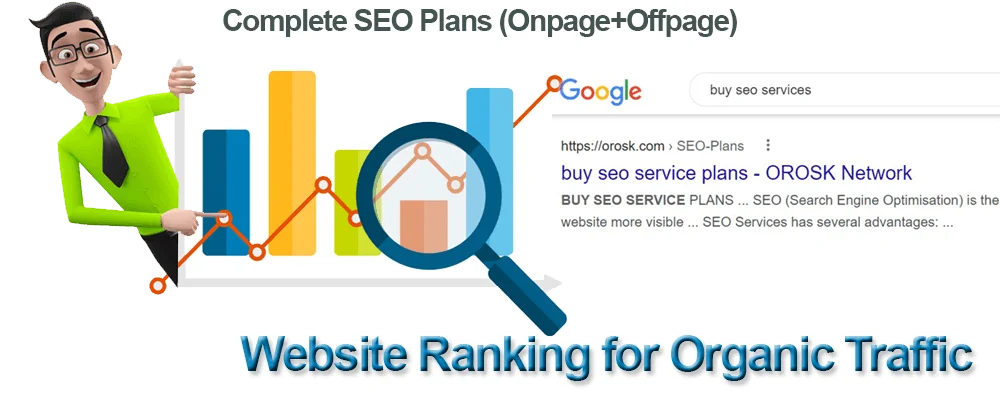Buy SEO Service Packages
SEO (Search Engine Optimization) is the only way to make your website more visible in search engines like Google, Bing or other. Once your keyword ranked on search engine in a good position, then you can see organic traffic to your website. So, we suggest you to buy SEO package.
Small Business SEO
18000 Rupees / US$ 250 (Monthly)
Purpose : Ranking, Branding
- On-Page
- Offpage SEO
- Technical SEO
- Competitor Analysis
Medium Business SEO
25000 Rupees / US$ 380 (Monthly)
Purpose : Ranking, Branding
- On-Page
- Offpage SEO
- Technical SEO
- Competitor Analysis
E-Commerce SEO
40000 Rupees / US$ 550 (Monthly)
Purpose : Ranking, Branding
- On-Page
- Offpage SEO
- Technical SEO
- Competitor Analysis

What are SEO’s On-Page, Off-Page, Technical, and Analytical components?
On-Page SEO
In search engines, on-page SEO refers to the process of improving individual web pages to rank higher and generate more relevant traffic. Among the things search engines take into account are meta tags, HTML source code, and content optimization.
Websites that improve on-page SEO become more visible to search engine crawlers, who can then more easily interpret the page’s relevance and content. This in turn raises the possibility of appearing higher for relevant searches in search engine results pages (SERPs).
In the end, good on-page SEO raises search engine ranks, enhances user experience, and draws in more natural traffic to websites.
Off-Page SEO
Off-page SEO describes actions taken outside of a website to raise its online presence and search engine rankings.
This include outreaching influencers, social media marketing, link building, and other tactics meant to improve a website’s authority, relevance, and reputation in search engine results.
Search engines are told a website is reliable and helpful to consumers by off-page SEO signals like social media interaction, brand mentions, and backlinks from reliable websites.
Websites may raise in search engine results pages (SERPs) and draw in more organic traffic from reliable sources by putting into practice efficient off-page SEO strategies.
Competitor Analysis
Finding Your Main SEO Rivals is the first step. These websites fight with you for your keywords. Find them via Moz, Ahrefs, or Semrush.
Dissect your competitors’ content tactics. Topics covered by them? Which media—articles, films, infographics—do they use? It’s easier to see opportunities and gaps when you know the subjects of their material.
Search Engine Optimization depends heavily on backlinks. Look into the backlink profiles of your competition. They have how many backlinks? To what degree are these relationships of quality? You may find this data using tools like Ahrefs or Moz.
Find Content Gaps: Search for subjects or valuable keywords that your rivals haven’t yet focused on. You have a great chance to produce material and maybe outrank them in search results.
Using competition analysis to guide your keyword research approach is known as keyword research with insights. Find lesser difficulty keywords that your rivals rank for. You may now compete more successfully.
Technical SEO
Search engine bots should find and access every page on your website with ease thanks to crawlability. It entails giving your robots.txt file optimization, looking for broken links, and maintaining an understandable site architecture.
Indexation: By assisting search engines in correctly indexing your websites, technical SEO allows them to show up in results. This include turning in a sitemap and fixing any indexing problems.
Search engines give webpages that load quickly priority. The performance of your website may be much increased by caching, reducing code, and optimizing pictures.
Mobile friendliness: A website must be adaptable to mobile devices as most searches these days take place on them. Google gives mobile-friendly websites preference in search results.
Structured data: Including structured data markup in your content gives search engines more information about it, which may increase click-through rates and result in richer search results.
Technical SEO and user trust both depend on having a safe website with a current SSL certificate.
